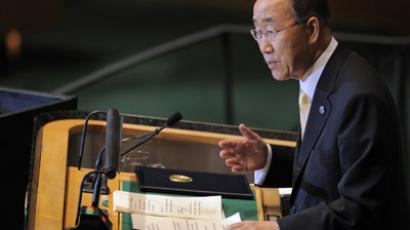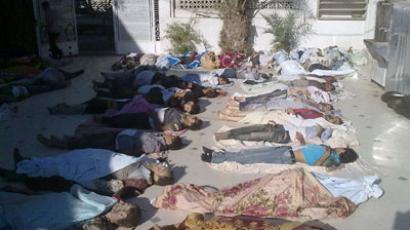Ban Ki-moon urges immediate investigation into 'Daraya massacre' (GRAPHIC VIDEO)
The UN Secretary General has condemned “the appalling and brutal crime” in the town of Daraya, calling for an inquest into the reported killing of more than 300 people over the weekend. Neither side fighting in Syria has claimed responsibility.
A handheld camera pans the streets of Daraya, a quiet suburb of the capital Damascus. All it sees are bodies – men, women, children; all dead, covered in blood. Some evidently tried to protect loved ones, with their bodies shielding those of their relatives. Others look like they faced a firing squad, with a sense of terror gripping anyone watching the never-ending lines of murdered Syrian civilians. A blame game has already started as to who actually committed the atrocity. Members and supporters of the opposition in the country quickly pointed fingers at government forces. Numerous activists and rebel fighters – mostly unnamed or using false names for “fear of reprisals” – blamed the government troops for the massacre, claiming the army tore through the town of Daraya, performing house-to-house raids “execution-style”. But the country’s official news agency reported a different story, stating government forces "cleansed Daraya from remnants of armed terrorist groups” who had committed crimes against the local people.In footage seen on Dunya TV, locals say they don’t know the identity of the perpetrators as they were hiding in shelters at the time of the attack. However, they mention on camera that they feel safe now that the army has retaken the town. On Monday, the UN Secretary General called for an immediate investigation into what happened in Daraya. Ban's spokesman said that the UN Office for the Commissioner for Human Rights was trying to gather information on the incident and “whoever is responsible needs to be held accountable and it underscores again the lack of protection for civilians that there is in Syria." Meanwhile, many fear that this atrocity could be used as a PR tool in the conflict.Journalist Neil Clark told RT that every time he hears of another crime allegedly committed by the Assad regime, he experiences a sense of déjà vu. “It’s pretty clear that there’s an agenda here; it’s to blacken the Syrian government’s name, and to use it as another pretext for intervention. It’s happened before and it’ll happen again, I’m afraid.”Clark pointed out that massacres always seem to happen just before an important UN meeting “and we’ve got to ask ourselves why.”“It’s all about the likes of William Hague and Hilary Clinton trying to put pressure on Russia and China to change their positions. And so before we get any independent verification of what’s gone on, we get these calls from these hawks that say look, Assad’s murdering his own people, we’ve got to intervene,” he said. “And then when the dust settles then we find a bit more information, it’s not as clear-cut as it appeared to be. Later on we find that actually the rebels were responsible for much of the killing then. It wasn’t clear-cut. So we’ve got to be very, very wary.”














